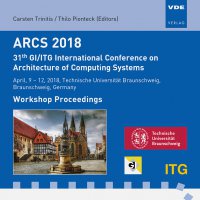Self-integrating Organic Control Systems: from Crayfish to Smart Homes
Conference: ARCS Workshop 2018 - 31th International Conference on Architecture of Computing Systems
04/09/2018 - 04/12/2018 at Braunschweig, Germany
Proceedings: ARCS Workshop 2018
Pages: 8Language: englishTyp: PDF
Personal VDE Members are entitled to a 10% discount on this title
Authors:
Diaconescu, Ada (Telecom ParisTech, LTCI, IMT, France)
Mata, Pembe (Telecom ParisTech, IMT, France)
Bellman, Kirstie (Topcy House Consulting, USA)
Abstract:
Survival in complex environments, for both natural and artificial systems, requires behavioural adaptation to common changes and behavioural innovation to face the unexpected. The challenge here is to produce a vast variety of behaviours, each adapted to current circumstances, while relying on a limited amount of resources (e.g. sensors, controllers and actuators), within a ‘suitable’ time-frame. Drawing inspiration from neural and behavioural studies on crayfish, this position paper brings to the fore several key design features that enable organisms to address this challenge. It then proposes a similar design for artificial controllers, based on: i) an extensible set of reusable control units; and, ii) a goal-driven, context-sensitive (self-)integration process for assembling control units into a wide variety of integrated system controllers. Pre-integrated sub-controllers can also be merged, to improve efficiency while avoiding conflicts. The proposal is illustrated via a proof-of-concept implementation for the smart home, where users can add and remove goals and devices at runtime and the controller is adapted accordingly. This study brings us closer to our long-term objective of defining reusable methodologies and platforms for the development of self-* systems running in complex unpredictable environments, notably including smart homes, cities, vehicular networks and electrical grids, merged via the Internet of Things, and of People.


